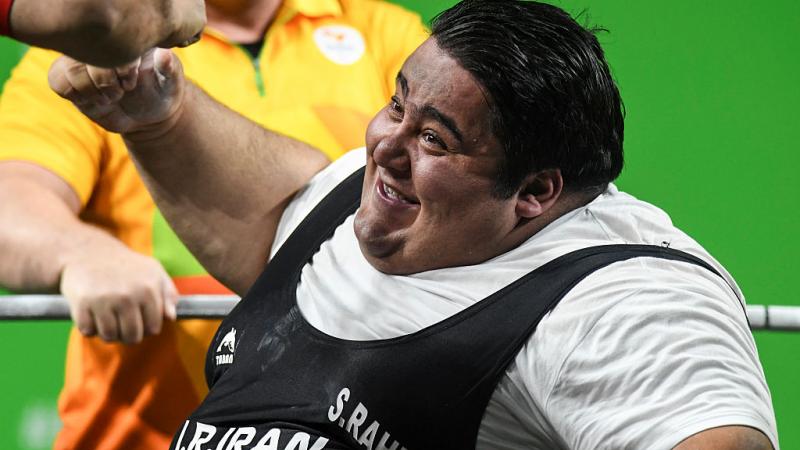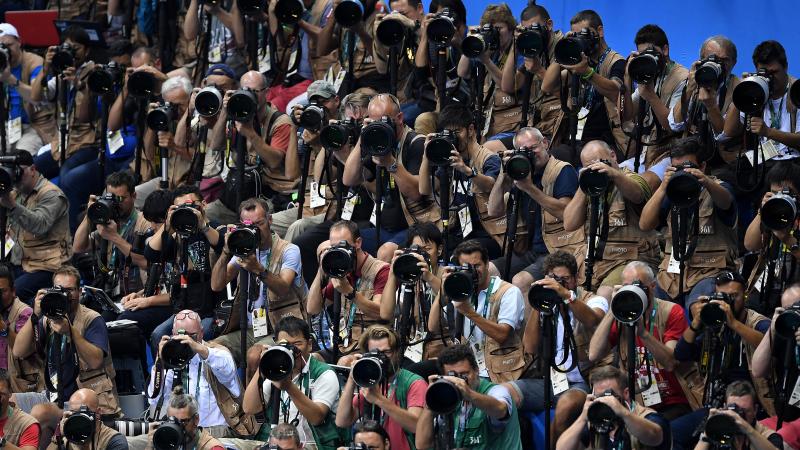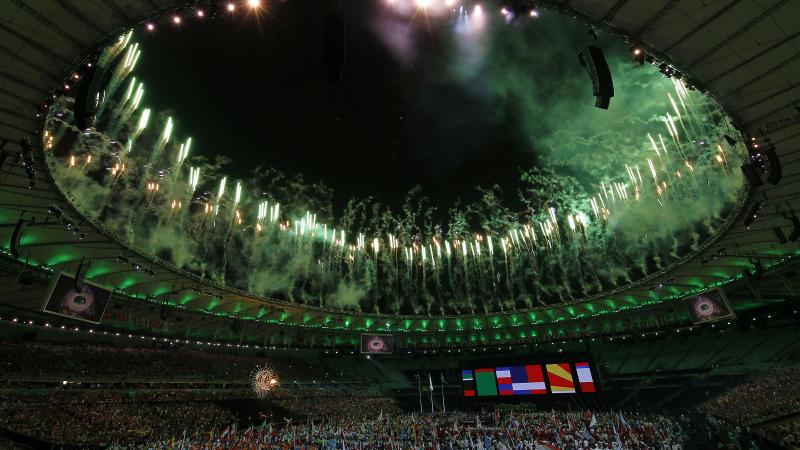RIO 2016 PARALYMPIC GAMES
Latin America’s first Paralympics will be remembered as the peoples’ Games where the people of Rio turned out in their droves to support athletes of all countries.
Rio 2016 arguably did more for the Paralympic Movement than any previous Games with record TV audiences, more than 2.1 million passionate spectators and outstanding performances from Para athletes.
A total of 4,328 Para athletes (2,657 men and 1,671 women) from 160 countries took part and over 12 days of sporting action 220 world and 432 Paralympic records were broken. An Independent Paralympic
Athletes team took part for the first time featuring two refugee athletes. Six NPCs made their Games debut, while canoe and triathlon made their Paralympic debuts.
There were 528 medal events across 22 sports and 83 countries won at least one Paralympic medal, more than any other previous Games.
A record 1,687 women athletes also took part, more than double the number that participated at the Atlanta 1996 Paralympics.
Sadly, the Games were not without tragedy. On the penultimate day of competition Iranian cyclist Bahman Golbarnezhad died following a crash in the road cycling event.
The Paralympics had a profound impact on Brazilian society. In 2018 the number of persons with disabilities in employment was 49 per cent higher than it was in 2009 when Rio won the right to stage the 2016 Olympic and Paralympic Games.
SPORTS
Rio 2016 featured 22 sports, two more than London 2012, with canoe and triathlon making their Paralympic debut.
Canoe took place at the iconic Lagoa venue whilst triathlon took place along the world famous Copacabana Beach.
The full programme featured archery, Para athletics, boccia, canoe, cycling, equestrian, football 5-a-side, football 7-a-side, goalball, judo, Para powerlifting, rowing, sailing, shooting Para sport, sitting volleyball, Para swimming, table tennis, triathlon, wheelchair basketball, wheelchair fencing, wheelchair rugby and wheelchair tennis.
TORCH RELAY
The Rio 2016 Paralympic Torch Relay involved five Brazilian cities – Brasilia, Belem, Natal, Sao Paulo and Joinville - and Stoke Mandeville in Great Britain before the six flames were brought together virtually to create the Paralympic Flame on Tuesday 6 September.
Following the creation of the Paralympic Flame, the Torch Relay visited a number of locations in Rio, including the Christ the Redeemer statue, before arriving at the Opening Ceremony on 7 September.
OPENING CEREMONY
Both the Opening and Closing Ceremonies took place at the world famous Maracana Stadium.
The Opening Ceremony on 7 September was a spectacular affair based around the theme “The heart has no limits. Everybody has a heart” and the Games were officially open by Brazil’s President Michel Temer.
The Ceremony took the audience on a journey which celebrated the origins of Paralympic sport at Stoke Mandeville in Great Britain, as well as Brazil’s love for dance, music, sport and the beach.
It began with a countdown started by extreme wheelchair athlete Aaron “Wheelz” Fotheringham, who travelled at high speed down a 17-metre-high ramp, the equivalent of a six-storey building, before jumping through a panel featuring the number zero.
The parade of athletes was led into the Maracana by Ibrahim Al-Hussein, the flag bearer for the International Paralympic Athletes (IPA) team. During the parade volunteers pieced together a giant jigsaw puzzle made up of 1,160 pieces which formed a picture featuring 6,315 photos of those taking part.
US Paralympic snowboarder Amy Purdy delighted the crowd with a dance partner she had kept secret until the big night – an industrial robot called Kuka – in a segment exploring man’s coexistence with technology.
The lighting of the cauldron by Brazilian swimming legend Clodoaldo Silva was greeted with a huge roar after an emotionally-charged final stage of the Paralympic flame’s journey around Brazil.
MEDALS
China topped the medals table for a fourth successive Paralympic Games claiming 239 medals in total, made up of 107 gold, 81 silver and 51 bronze. The top five was made up of Great Britain, Ukraine, USA and Australia.
Kazakhstan (1 gold), Georgia (1 gold), Malaysia (3 golds), Uzbekistan (8 golds) and Vietnam (1 gold) won Paralympic titles for the first time, whilst Cape Verde, Mozambique, Qatar and Uganda claimed their first medals at a Paralympic Games.
In total 83 countries won at least one medal, the most ever in Paralympic history.
OUTSTANDING PERFORMANCES
The Rio 2016 Paralympics were the best Games ever in terms of athletic performance.
Belarusian swimmer Ihar Boki was the most decorated athlete taking home six gold medals and a bronze. In track and field, the USA’s Tatyana McFadden claimed six medals, made up of four golds and two silver, whilst Cuba’s Omara Durand reaffirmed her position as the world’s fastest female Paralympian winning three sprint golds and breaking two world records.
In powerlifting Iran’s Siamand Rahman created history by becoming the first Paralympian to lift over 300kg. The world’s strongest Paralympian eventually lifted a staggering 310kg, equivalent to a large Siberian tiger.
The “Paralympic Pele” Jefinho was the star of the show in football 5-a-side scoring some outstanding goals as Brazil claimed its fourth successive Paralympic title in the sport.
After adding to their bulging medal collections in Rio, Great Britain’s Sarah Storey and New Zealand’s Sophie Pascoe became the most decorated Paralympians from their respective countries.
The star performer for hosts Brazil was swimmer Daniel Dias who, in winning nine medals, made the podium more than any other athlete at the Games. He finished with four gold, three silver and two bronze medals.
ATTENDANCE AND COVERAGE
Despite initial slow ticket sales, the Games attracted 2.15 million spectators making Rio 2016 the second biggest Games in terms of paying ticket holders after London 2012. The Rio public – the Cariocas – turned out in force creating a carnival atmosphere in many of the venues as whole generations of families enjoyed the sport on show.
Online the Games reached more people than ever before with the IPC’s digital media activities engaging close to one billion people.
The IPC website had nearly twice as many visitors during Rio 2016 as it did during London 2012. The website showed live coverage from 13 sports and featured live results from all 22 sports.
The Games were the most broadcast in the history of the Paralympics and were covered by television, radio and online outlets in a record 154 countries.
CLOSING CEREMONY
At the Closing Ceremony, it was announced by the IPC President that the people of Rio and Brazil would be awarded the Paralympic Order in recognition of their outstanding support for the Rio 2016 Games.
Earlier, Sir Philip had led the capacity crowd in a moment of silence in tribute to Iranian cyclist Bahman Golbarnezhad and paid tribute to the performances of all athletes.
“Paralympians, your exceptional performances focused the world on your sensational abilities,” said Sir Philip. “People were in awe at what you could do and forgot about what they believed you could not. You showed to the world that with a positive attitude the human body, and above all the human heart and mind, knows no limits and absolutely anything is possible.
“You defied expectations, rewrote the record books and turned ill-found pity into pride. You are now heroes and role models for a new generation of sports fans from all over the world.”
The distinctive cry of ‘Brazil’ rang out again at the Maracana as the Brazilian flag was paraded by Ricardinho, the match-winner for Brazil in the final of the football 5-a-side tournament.
The Whang Youn Dai Achievement Award for the two Paralympians who were considered to best exemplify the spirit and values of the Games was presented to the USA’s Tatyana McFadden and Ibrahim Al Hussein, who competed under the Paralympic flag for the IPA team.

 Facebook
Facebook
 Instagram
Instagram
 Twitter
Twitter
 Youtube
Youtube
 TikTok
TikTok
 Newsletter Subscribe
Newsletter Subscribe



